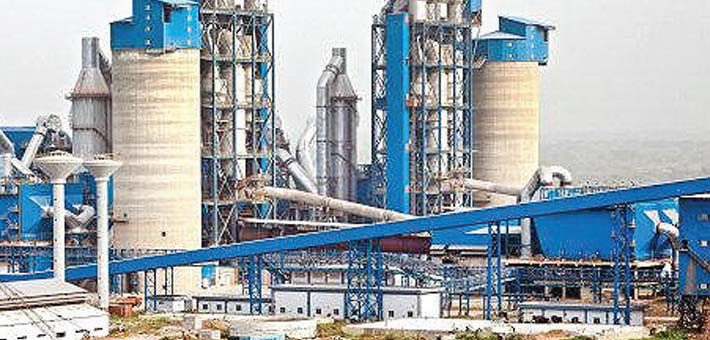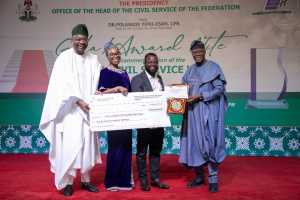
Africa’s biggest cement manufacturer, Dangote Cement Plc, has ramped up production at its newest plant in Okpella, an industrial community in Edo State, even as its earnings per share rose by 16.8 per cent to N6.18 in the first quarter (Q1).
The Okpella plant is part of the company’s efforts to increase supply in Nigeria as well as ensure timely supply of products to customers in the Southsouth and Southeast regions.
Analysis of the cement giant’s three months results indicated that Dangote Cement sold a total volume of 7.2 metric tonnes (MTs) of cement across the group with Nigerian operations accounting for 4.8Mts while the rest of Africa did the balance of 2.4MTs.
Chief Executive Officer, Dangote Cement, Michel Puchercos, said that the company started the first quarter on a positive note despite the new uncertainties brought by a volatile global environment.
He said increases were recorded in revenue and profitability that drove strong cash generation across the Group.
Profit after tax (PAT) rose to ₦105.9 billion, up 18 per cent compared to last year while the Group’s earnings before interest, taxes, depreciation, and amortization (EBITDA) rose to ₦211 billion, by 18.6 per cent with an EBITDA margin of 51.1 per cent.
“On the operational side, we are ramping up production at our Okpella plant and are progressing well to deploy grinding plants in Ghana and Cote d’Ivoire. Demand remained strong across all markets and we remain confident that Dangote Cement is positioned to meet customers’ expectations despite these temporary challenges.
“Continuing our efforts to deliver shareholder value, Dangote Cement completed the second tranche of its buyback programme. Following the completion of both tranches, Dangote Cement has now bought back 0.98 per cent of its shares outstanding. This share buy-back programme reflects the company’s commitment to finding opportunities beyond dividends to return cash to shareholders,” Puchercos said
He continued: “The volatile international context is strengthening our efforts to ramp up the usage of alternative fuels and execution of our export-to-import strategy. Reducing our dependence on imported inputs and making our markets self-sufficient has never been more relevant from a regional perspective.
“Our continuous focus on efficiency, meeting strong market demand and maintaining our cost leadership drives our ability to consistently deliver superior profitability and value to all shareholders.”
Meanwhile, the company is to empower stakeholders in the value chain of palm kernel shell (PKS) supply as part of its strategies to shore up and sustain its availability as a waste that is co-processed in the cement kiln to recover energy.
This, the cement manufacturer said, is part of its contribution to the global environmental preservation efforts and wealth creation.
To this end, the company said it has instituted periodic value chain analysis and community engagements with PKS waste collectors as well as the palm oil millers in communities across Nigeria.
A team from Dangote Cement led by the Head, Alternative Fuel Project, Peter Anagbe, and Head, Sustainability, Dr. Igazeuma Okoroba, was at one of the farm settlements in Ikire, Osun State, where PKS are sourced to ascertain the needs of the community and ways the company could empower the residents.
In a statement, Anagbe told the community that Dangote Cement was desirous of ensuring sustainable collection of waste materials in the form of PKS as a means of improving the environment and adding value to their source of livelihood.
He urged the people to always look at alternative value-adding opportunities to waste in whatever they are doing taking a cue from the PKS which hitherto was a waste that is openly incinerated, causing environmental pollution.
One of the community leaders, Elder Hammed Adekunle, who conducted the team around the site of palm oil mills in the area explained that the mainstay of the community economy is palm oil milling and that the use of PKS for co-processing, offered them the opportunity to expand and diversify.
He lamented that the process of palm oil production, which in turn generates PKS waste, is a very tedious one and would appreciate any support from Dangote Cement for them to acquire modern machines to process the palm oil and in turn, generate the PKS.
The entire process of getting PKS from the harvesting of palm trees, he disclosed, involves as many as 30 people depending on the volume of the palm tree being harvested.
Elder Adekunle expressed gratitude at the gesture of the management of Dangote Cement noting that the cement company was the first to visit them and show empathy saying “this means Dangote cement values us as a critical stakeholder in the value chain of ensuring zero-waste-to-landfill by evacuating the waste palm kernel shell (PKS).
Earlier, the Dangote team met with the various stakeholders within the Ikire hub, during which the actors in the value chain enumerated the challenges faced by them while trying to collect the waste from different locations.
According to one of them, Prince Oloyan Lawal, a general challenge faced by them is the issue of logistics as they have to move from one settlement to the other to collect the waste and the settlements are usually not motorable.
Speaking on behalf of others, he thanked the Dangote Cement team for coming to enlighten them more on waste management and the benefits inherent in the value chain. He stated that most of them are farmers and that the value exchanged for the waste (PKS as a by-product of palm oil) collection is seen as a part-time activity and given the enlightenment by the Dangote Cement team, they would devote more attention to the activity.
Anagbe and Dr. Igazeuma urged the stakeholders to have an open mindset toward a circular economy as most of the materials which are dumped as wastes are now sources of waste-to-wealth which goes a long way to improve the environment as well as the economy of the rural dwellers.
They assured that Dangote Cement would partner with them to ensure that they reap the desired benefits from the culture of turning waste into wealth and protecting the environment.
The team later headed to Ibese cement plant on a tour of the Alternative Fuel Pneumatic Feeding System and the PKS storage area. The feeding system was fabricated and assembled in-house, using obsolete equipment that was recycled. The feeding system systematically dozes the PKS into the calciner of the cement kiln, where the waste is co-processed at high temperatures, leaving zero waste and emissions.
Acting Ibese Plant Director, Myneni Nageswara, who received the team members, thanked them for its efforts at ensuring that Dangote Cement is not left behind in the global efforts at providing alternative fuel sources to traditional fossil fuels, thereby mitigating the impact of emissions and conserving energy.
He particularly praised the Ibese team for a job well done in the fabrication of the Pneumatic Feeing system which uses the PKS to thermally substitute the heat energy required by the kiln in the cement-making process. He urged management to fast-track the installation of additional feeding systems to increase the waste co-processing capacity of the plant.
Anagbe explained that the visit was necessitated by the shift in global attention to alternative fuel sourcing, which is expected to contribute to the realization of ‘zero emission’ and ‘zero waste’ concepts. He added that alternative fuel can be produced from







